Report on the Contemporary Hospitality Industry: Hilton Hotels Focus
VerifiedAdded on 2023/01/09
|8
|1941
|39
Report
AI Summary
This report provides a comprehensive analysis of the contemporary hospitality industry, with a specific focus on Hilton Hotels. It begins with an introduction to the industry, encompassing various business types like hotels, restaurants, and theme parks. The main body of the report delves into Hilton Hotels, examining its operational and functional departments such as finance, marketing, and human resources, highlighting their interrelationships. It explores the hospitality industry's contributions to local, national, and international economies and discusses the influence of franchising and licensing agreements on industry growth. The report also outlines various operational roles within the industry, the required skills for these roles, and identifies existing skill gaps, along with their impact on businesses. The report uses a PPT for the conclusion and cites several academic sources. Overall, the report offers a detailed overview of the hospitality sector's complexities and dynamics, using Hilton Hotels as a case study.
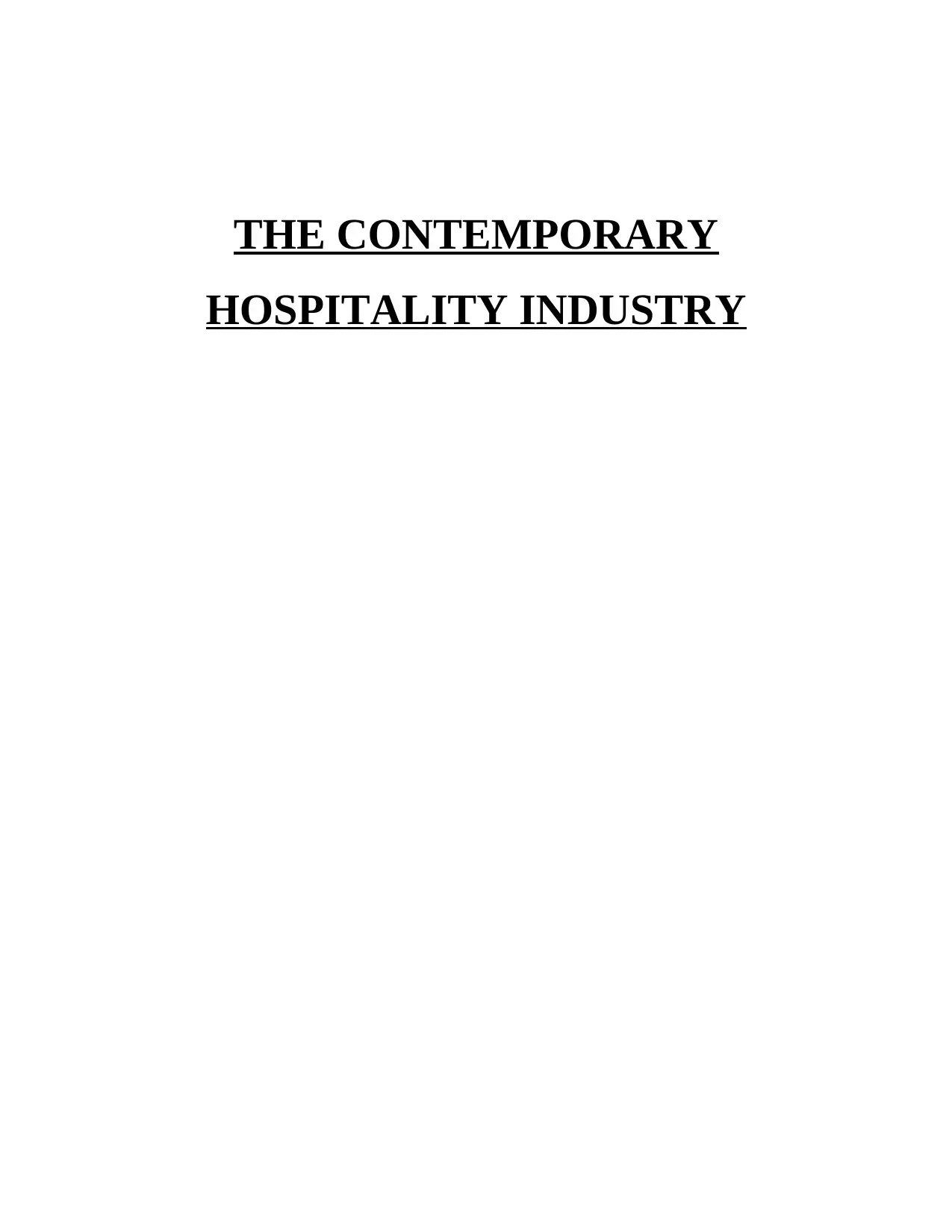
THE CONTEMPORARY
HOSPITALITY INDUSTRY
HOSPITALITY INDUSTRY
Paraphrase This Document
Need a fresh take? Get an instant paraphrase of this document with our AI Paraphraser
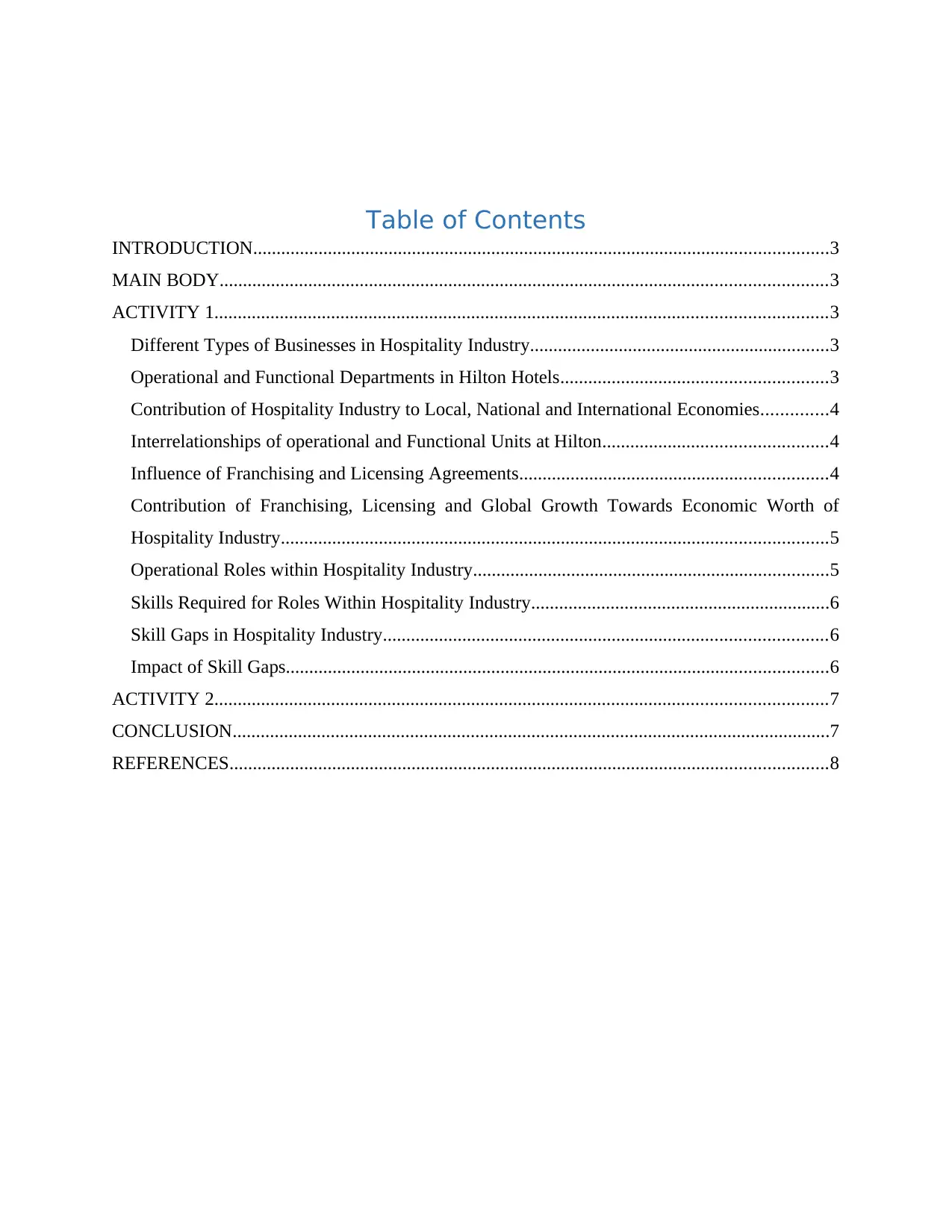
Table of Contents
INTRODUCTION...........................................................................................................................3
MAIN BODY..................................................................................................................................3
ACTIVITY 1...................................................................................................................................3
Different Types of Businesses in Hospitality Industry................................................................3
Operational and Functional Departments in Hilton Hotels.........................................................3
Contribution of Hospitality Industry to Local, National and International Economies..............4
Interrelationships of operational and Functional Units at Hilton................................................4
Influence of Franchising and Licensing Agreements..................................................................4
Contribution of Franchising, Licensing and Global Growth Towards Economic Worth of
Hospitality Industry.....................................................................................................................5
Operational Roles within Hospitality Industry............................................................................5
Skills Required for Roles Within Hospitality Industry................................................................6
Skill Gaps in Hospitality Industry...............................................................................................6
Impact of Skill Gaps....................................................................................................................6
ACTIVITY 2...................................................................................................................................7
CONCLUSION................................................................................................................................7
REFERENCES................................................................................................................................8
INTRODUCTION...........................................................................................................................3
MAIN BODY..................................................................................................................................3
ACTIVITY 1...................................................................................................................................3
Different Types of Businesses in Hospitality Industry................................................................3
Operational and Functional Departments in Hilton Hotels.........................................................3
Contribution of Hospitality Industry to Local, National and International Economies..............4
Interrelationships of operational and Functional Units at Hilton................................................4
Influence of Franchising and Licensing Agreements..................................................................4
Contribution of Franchising, Licensing and Global Growth Towards Economic Worth of
Hospitality Industry.....................................................................................................................5
Operational Roles within Hospitality Industry............................................................................5
Skills Required for Roles Within Hospitality Industry................................................................6
Skill Gaps in Hospitality Industry...............................................................................................6
Impact of Skill Gaps....................................................................................................................6
ACTIVITY 2...................................................................................................................................7
CONCLUSION................................................................................................................................7
REFERENCES................................................................................................................................8
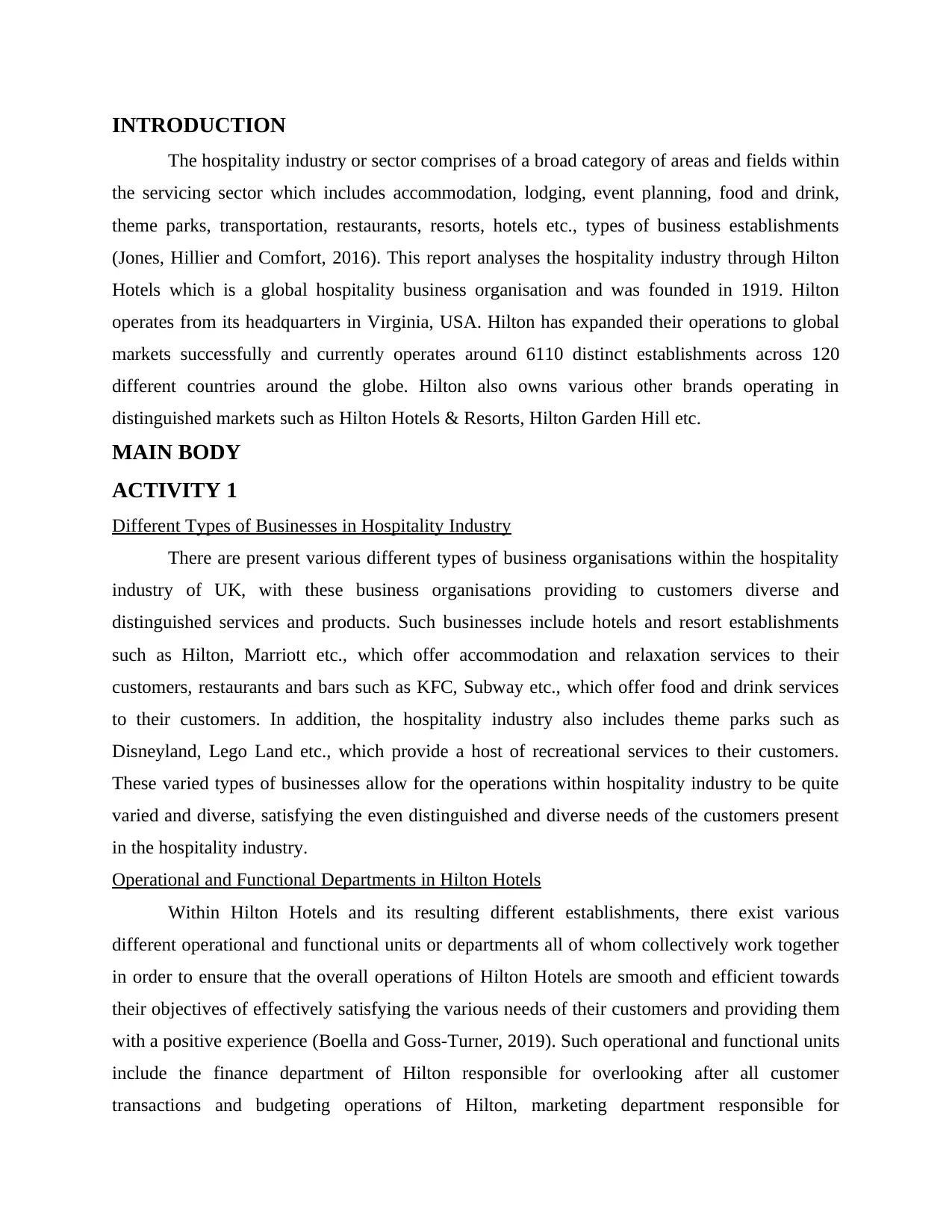
INTRODUCTION
The hospitality industry or sector comprises of a broad category of areas and fields within
the servicing sector which includes accommodation, lodging, event planning, food and drink,
theme parks, transportation, restaurants, resorts, hotels etc., types of business establishments
(Jones, Hillier and Comfort, 2016). This report analyses the hospitality industry through Hilton
Hotels which is a global hospitality business organisation and was founded in 1919. Hilton
operates from its headquarters in Virginia, USA. Hilton has expanded their operations to global
markets successfully and currently operates around 6110 distinct establishments across 120
different countries around the globe. Hilton also owns various other brands operating in
distinguished markets such as Hilton Hotels & Resorts, Hilton Garden Hill etc.
MAIN BODY
ACTIVITY 1
Different Types of Businesses in Hospitality Industry
There are present various different types of business organisations within the hospitality
industry of UK, with these business organisations providing to customers diverse and
distinguished services and products. Such businesses include hotels and resort establishments
such as Hilton, Marriott etc., which offer accommodation and relaxation services to their
customers, restaurants and bars such as KFC, Subway etc., which offer food and drink services
to their customers. In addition, the hospitality industry also includes theme parks such as
Disneyland, Lego Land etc., which provide a host of recreational services to their customers.
These varied types of businesses allow for the operations within hospitality industry to be quite
varied and diverse, satisfying the even distinguished and diverse needs of the customers present
in the hospitality industry.
Operational and Functional Departments in Hilton Hotels
Within Hilton Hotels and its resulting different establishments, there exist various
different operational and functional units or departments all of whom collectively work together
in order to ensure that the overall operations of Hilton Hotels are smooth and efficient towards
their objectives of effectively satisfying the various needs of their customers and providing them
with a positive experience (Boella and Goss-Turner, 2019). Such operational and functional units
include the finance department of Hilton responsible for overlooking after all customer
transactions and budgeting operations of Hilton, marketing department responsible for
The hospitality industry or sector comprises of a broad category of areas and fields within
the servicing sector which includes accommodation, lodging, event planning, food and drink,
theme parks, transportation, restaurants, resorts, hotels etc., types of business establishments
(Jones, Hillier and Comfort, 2016). This report analyses the hospitality industry through Hilton
Hotels which is a global hospitality business organisation and was founded in 1919. Hilton
operates from its headquarters in Virginia, USA. Hilton has expanded their operations to global
markets successfully and currently operates around 6110 distinct establishments across 120
different countries around the globe. Hilton also owns various other brands operating in
distinguished markets such as Hilton Hotels & Resorts, Hilton Garden Hill etc.
MAIN BODY
ACTIVITY 1
Different Types of Businesses in Hospitality Industry
There are present various different types of business organisations within the hospitality
industry of UK, with these business organisations providing to customers diverse and
distinguished services and products. Such businesses include hotels and resort establishments
such as Hilton, Marriott etc., which offer accommodation and relaxation services to their
customers, restaurants and bars such as KFC, Subway etc., which offer food and drink services
to their customers. In addition, the hospitality industry also includes theme parks such as
Disneyland, Lego Land etc., which provide a host of recreational services to their customers.
These varied types of businesses allow for the operations within hospitality industry to be quite
varied and diverse, satisfying the even distinguished and diverse needs of the customers present
in the hospitality industry.
Operational and Functional Departments in Hilton Hotels
Within Hilton Hotels and its resulting different establishments, there exist various
different operational and functional units or departments all of whom collectively work together
in order to ensure that the overall operations of Hilton Hotels are smooth and efficient towards
their objectives of effectively satisfying the various needs of their customers and providing them
with a positive experience (Boella and Goss-Turner, 2019). Such operational and functional units
include the finance department of Hilton responsible for overlooking after all customer
transactions and budgeting operations of Hilton, marketing department responsible for
⊘ This is a preview!⊘
Do you want full access?
Subscribe today to unlock all pages.

Trusted by 1+ million students worldwide
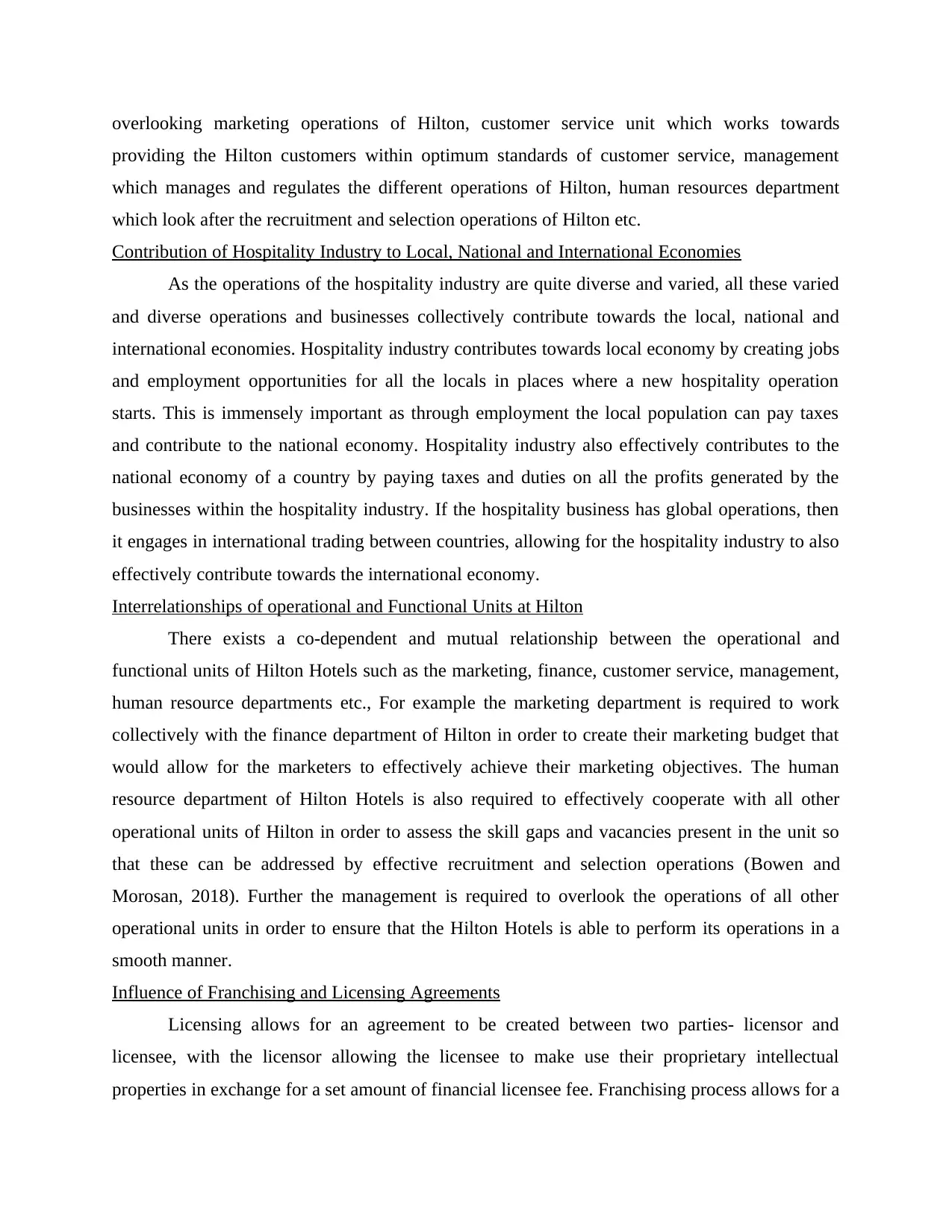
overlooking marketing operations of Hilton, customer service unit which works towards
providing the Hilton customers within optimum standards of customer service, management
which manages and regulates the different operations of Hilton, human resources department
which look after the recruitment and selection operations of Hilton etc.
Contribution of Hospitality Industry to Local, National and International Economies
As the operations of the hospitality industry are quite diverse and varied, all these varied
and diverse operations and businesses collectively contribute towards the local, national and
international economies. Hospitality industry contributes towards local economy by creating jobs
and employment opportunities for all the locals in places where a new hospitality operation
starts. This is immensely important as through employment the local population can pay taxes
and contribute to the national economy. Hospitality industry also effectively contributes to the
national economy of a country by paying taxes and duties on all the profits generated by the
businesses within the hospitality industry. If the hospitality business has global operations, then
it engages in international trading between countries, allowing for the hospitality industry to also
effectively contribute towards the international economy.
Interrelationships of operational and Functional Units at Hilton
There exists a co-dependent and mutual relationship between the operational and
functional units of Hilton Hotels such as the marketing, finance, customer service, management,
human resource departments etc., For example the marketing department is required to work
collectively with the finance department of Hilton in order to create their marketing budget that
would allow for the marketers to effectively achieve their marketing objectives. The human
resource department of Hilton Hotels is also required to effectively cooperate with all other
operational units of Hilton in order to assess the skill gaps and vacancies present in the unit so
that these can be addressed by effective recruitment and selection operations (Bowen and
Morosan, 2018). Further the management is required to overlook the operations of all other
operational units in order to ensure that the Hilton Hotels is able to perform its operations in a
smooth manner.
Influence of Franchising and Licensing Agreements
Licensing allows for an agreement to be created between two parties- licensor and
licensee, with the licensor allowing the licensee to make use their proprietary intellectual
properties in exchange for a set amount of financial licensee fee. Franchising process allows for a
providing the Hilton customers within optimum standards of customer service, management
which manages and regulates the different operations of Hilton, human resources department
which look after the recruitment and selection operations of Hilton etc.
Contribution of Hospitality Industry to Local, National and International Economies
As the operations of the hospitality industry are quite diverse and varied, all these varied
and diverse operations and businesses collectively contribute towards the local, national and
international economies. Hospitality industry contributes towards local economy by creating jobs
and employment opportunities for all the locals in places where a new hospitality operation
starts. This is immensely important as through employment the local population can pay taxes
and contribute to the national economy. Hospitality industry also effectively contributes to the
national economy of a country by paying taxes and duties on all the profits generated by the
businesses within the hospitality industry. If the hospitality business has global operations, then
it engages in international trading between countries, allowing for the hospitality industry to also
effectively contribute towards the international economy.
Interrelationships of operational and Functional Units at Hilton
There exists a co-dependent and mutual relationship between the operational and
functional units of Hilton Hotels such as the marketing, finance, customer service, management,
human resource departments etc., For example the marketing department is required to work
collectively with the finance department of Hilton in order to create their marketing budget that
would allow for the marketers to effectively achieve their marketing objectives. The human
resource department of Hilton Hotels is also required to effectively cooperate with all other
operational units of Hilton in order to assess the skill gaps and vacancies present in the unit so
that these can be addressed by effective recruitment and selection operations (Bowen and
Morosan, 2018). Further the management is required to overlook the operations of all other
operational units in order to ensure that the Hilton Hotels is able to perform its operations in a
smooth manner.
Influence of Franchising and Licensing Agreements
Licensing allows for an agreement to be created between two parties- licensor and
licensee, with the licensor allowing the licensee to make use their proprietary intellectual
properties in exchange for a set amount of financial licensee fee. Franchising process allows for a
Paraphrase This Document
Need a fresh take? Get an instant paraphrase of this document with our AI Paraphraser
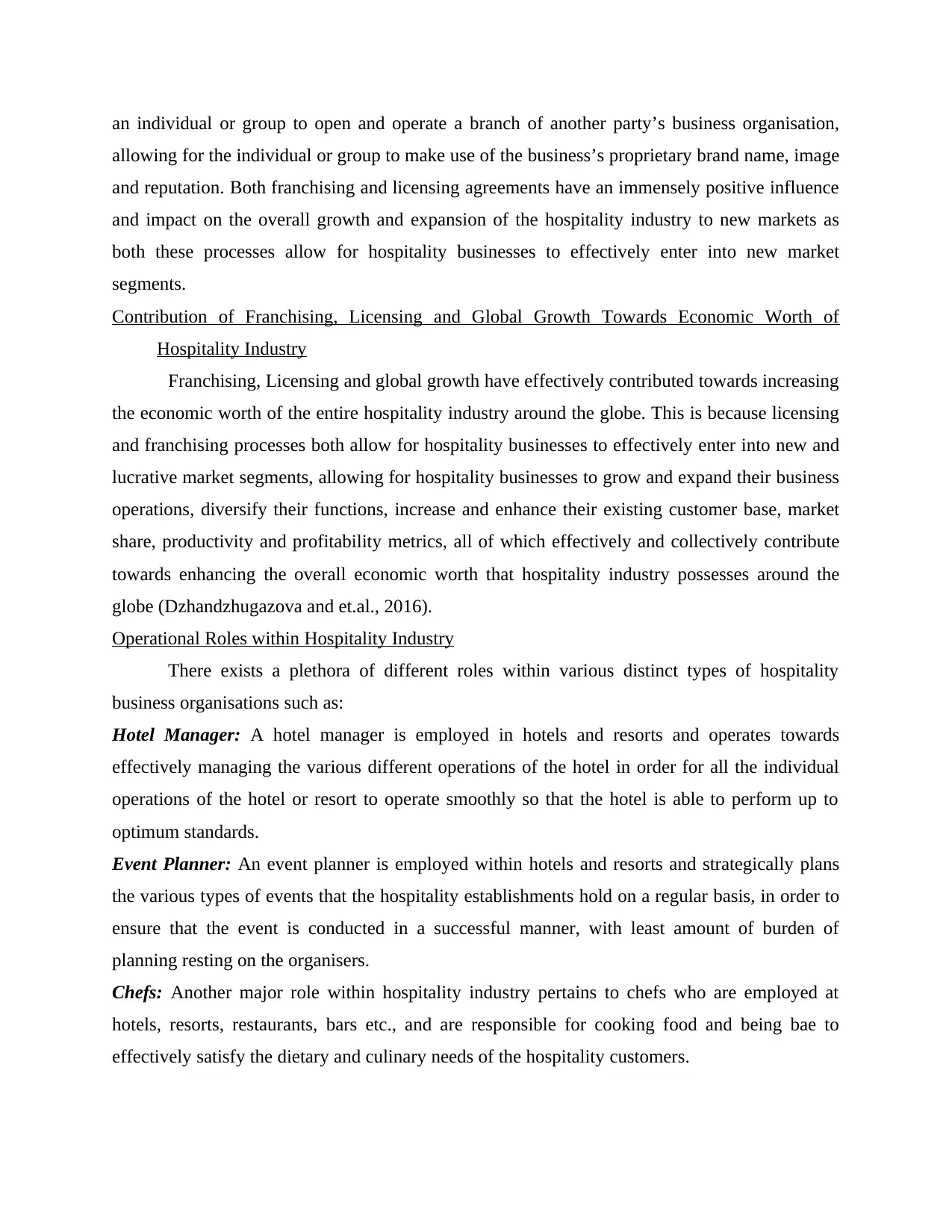
an individual or group to open and operate a branch of another party’s business organisation,
allowing for the individual or group to make use of the business’s proprietary brand name, image
and reputation. Both franchising and licensing agreements have an immensely positive influence
and impact on the overall growth and expansion of the hospitality industry to new markets as
both these processes allow for hospitality businesses to effectively enter into new market
segments.
Contribution of Franchising, Licensing and Global Growth Towards Economic Worth of
Hospitality Industry
Franchising, Licensing and global growth have effectively contributed towards increasing
the economic worth of the entire hospitality industry around the globe. This is because licensing
and franchising processes both allow for hospitality businesses to effectively enter into new and
lucrative market segments, allowing for hospitality businesses to grow and expand their business
operations, diversify their functions, increase and enhance their existing customer base, market
share, productivity and profitability metrics, all of which effectively and collectively contribute
towards enhancing the overall economic worth that hospitality industry possesses around the
globe (Dzhandzhugazova and et.al., 2016).
Operational Roles within Hospitality Industry
There exists a plethora of different roles within various distinct types of hospitality
business organisations such as:
Hotel Manager: A hotel manager is employed in hotels and resorts and operates towards
effectively managing the various different operations of the hotel in order for all the individual
operations of the hotel or resort to operate smoothly so that the hotel is able to perform up to
optimum standards.
Event Planner: An event planner is employed within hotels and resorts and strategically plans
the various types of events that the hospitality establishments hold on a regular basis, in order to
ensure that the event is conducted in a successful manner, with least amount of burden of
planning resting on the organisers.
Chefs: Another major role within hospitality industry pertains to chefs who are employed at
hotels, resorts, restaurants, bars etc., and are responsible for cooking food and being bae to
effectively satisfy the dietary and culinary needs of the hospitality customers.
allowing for the individual or group to make use of the business’s proprietary brand name, image
and reputation. Both franchising and licensing agreements have an immensely positive influence
and impact on the overall growth and expansion of the hospitality industry to new markets as
both these processes allow for hospitality businesses to effectively enter into new market
segments.
Contribution of Franchising, Licensing and Global Growth Towards Economic Worth of
Hospitality Industry
Franchising, Licensing and global growth have effectively contributed towards increasing
the economic worth of the entire hospitality industry around the globe. This is because licensing
and franchising processes both allow for hospitality businesses to effectively enter into new and
lucrative market segments, allowing for hospitality businesses to grow and expand their business
operations, diversify their functions, increase and enhance their existing customer base, market
share, productivity and profitability metrics, all of which effectively and collectively contribute
towards enhancing the overall economic worth that hospitality industry possesses around the
globe (Dzhandzhugazova and et.al., 2016).
Operational Roles within Hospitality Industry
There exists a plethora of different roles within various distinct types of hospitality
business organisations such as:
Hotel Manager: A hotel manager is employed in hotels and resorts and operates towards
effectively managing the various different operations of the hotel in order for all the individual
operations of the hotel or resort to operate smoothly so that the hotel is able to perform up to
optimum standards.
Event Planner: An event planner is employed within hotels and resorts and strategically plans
the various types of events that the hospitality establishments hold on a regular basis, in order to
ensure that the event is conducted in a successful manner, with least amount of burden of
planning resting on the organisers.
Chefs: Another major role within hospitality industry pertains to chefs who are employed at
hotels, resorts, restaurants, bars etc., and are responsible for cooking food and being bae to
effectively satisfy the dietary and culinary needs of the hospitality customers.
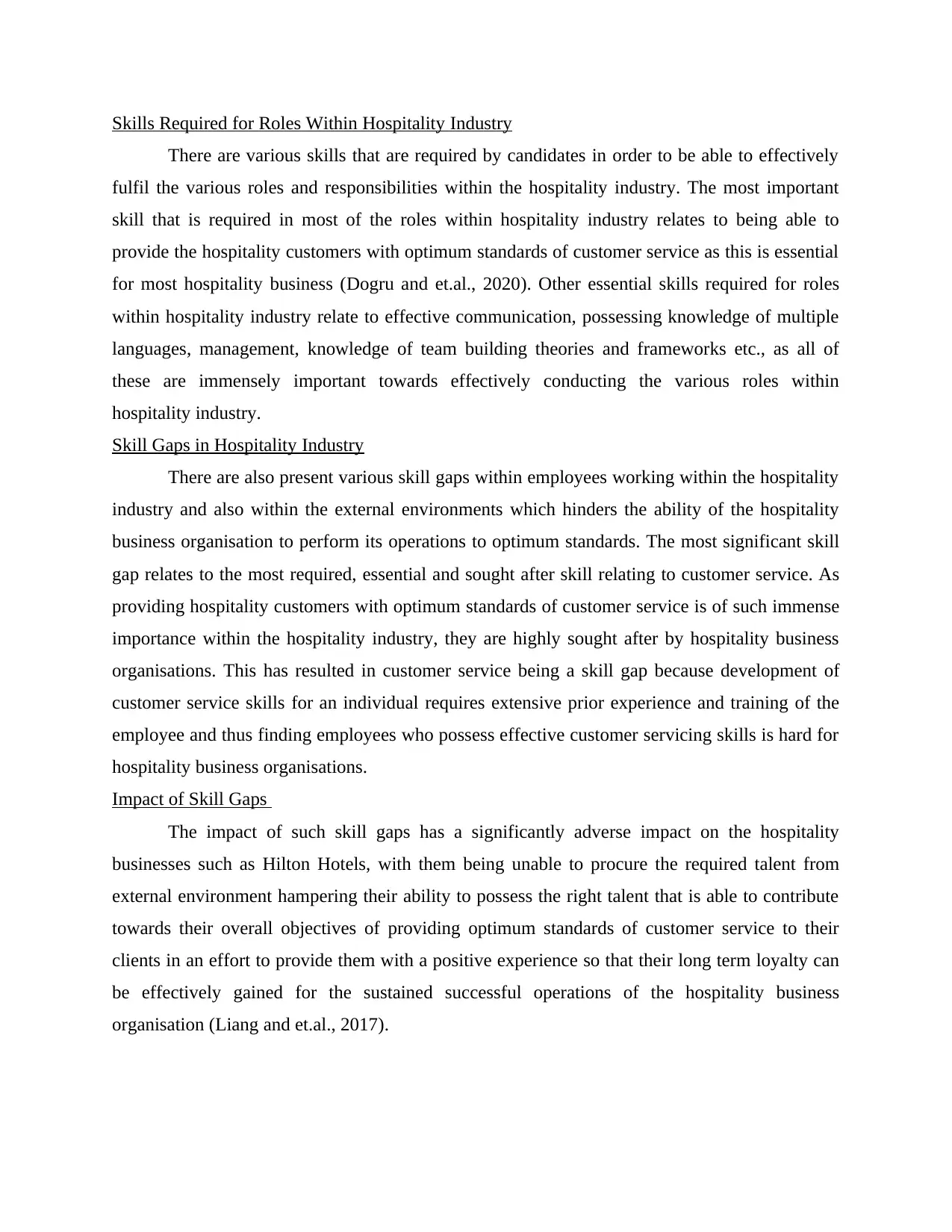
Skills Required for Roles Within Hospitality Industry
There are various skills that are required by candidates in order to be able to effectively
fulfil the various roles and responsibilities within the hospitality industry. The most important
skill that is required in most of the roles within hospitality industry relates to being able to
provide the hospitality customers with optimum standards of customer service as this is essential
for most hospitality business (Dogru and et.al., 2020). Other essential skills required for roles
within hospitality industry relate to effective communication, possessing knowledge of multiple
languages, management, knowledge of team building theories and frameworks etc., as all of
these are immensely important towards effectively conducting the various roles within
hospitality industry.
Skill Gaps in Hospitality Industry
There are also present various skill gaps within employees working within the hospitality
industry and also within the external environments which hinders the ability of the hospitality
business organisation to perform its operations to optimum standards. The most significant skill
gap relates to the most required, essential and sought after skill relating to customer service. As
providing hospitality customers with optimum standards of customer service is of such immense
importance within the hospitality industry, they are highly sought after by hospitality business
organisations. This has resulted in customer service being a skill gap because development of
customer service skills for an individual requires extensive prior experience and training of the
employee and thus finding employees who possess effective customer servicing skills is hard for
hospitality business organisations.
Impact of Skill Gaps
The impact of such skill gaps has a significantly adverse impact on the hospitality
businesses such as Hilton Hotels, with them being unable to procure the required talent from
external environment hampering their ability to possess the right talent that is able to contribute
towards their overall objectives of providing optimum standards of customer service to their
clients in an effort to provide them with a positive experience so that their long term loyalty can
be effectively gained for the sustained successful operations of the hospitality business
organisation (Liang and et.al., 2017).
There are various skills that are required by candidates in order to be able to effectively
fulfil the various roles and responsibilities within the hospitality industry. The most important
skill that is required in most of the roles within hospitality industry relates to being able to
provide the hospitality customers with optimum standards of customer service as this is essential
for most hospitality business (Dogru and et.al., 2020). Other essential skills required for roles
within hospitality industry relate to effective communication, possessing knowledge of multiple
languages, management, knowledge of team building theories and frameworks etc., as all of
these are immensely important towards effectively conducting the various roles within
hospitality industry.
Skill Gaps in Hospitality Industry
There are also present various skill gaps within employees working within the hospitality
industry and also within the external environments which hinders the ability of the hospitality
business organisation to perform its operations to optimum standards. The most significant skill
gap relates to the most required, essential and sought after skill relating to customer service. As
providing hospitality customers with optimum standards of customer service is of such immense
importance within the hospitality industry, they are highly sought after by hospitality business
organisations. This has resulted in customer service being a skill gap because development of
customer service skills for an individual requires extensive prior experience and training of the
employee and thus finding employees who possess effective customer servicing skills is hard for
hospitality business organisations.
Impact of Skill Gaps
The impact of such skill gaps has a significantly adverse impact on the hospitality
businesses such as Hilton Hotels, with them being unable to procure the required talent from
external environment hampering their ability to possess the right talent that is able to contribute
towards their overall objectives of providing optimum standards of customer service to their
clients in an effort to provide them with a positive experience so that their long term loyalty can
be effectively gained for the sustained successful operations of the hospitality business
organisation (Liang and et.al., 2017).
⊘ This is a preview!⊘
Do you want full access?
Subscribe today to unlock all pages.

Trusted by 1+ million students worldwide
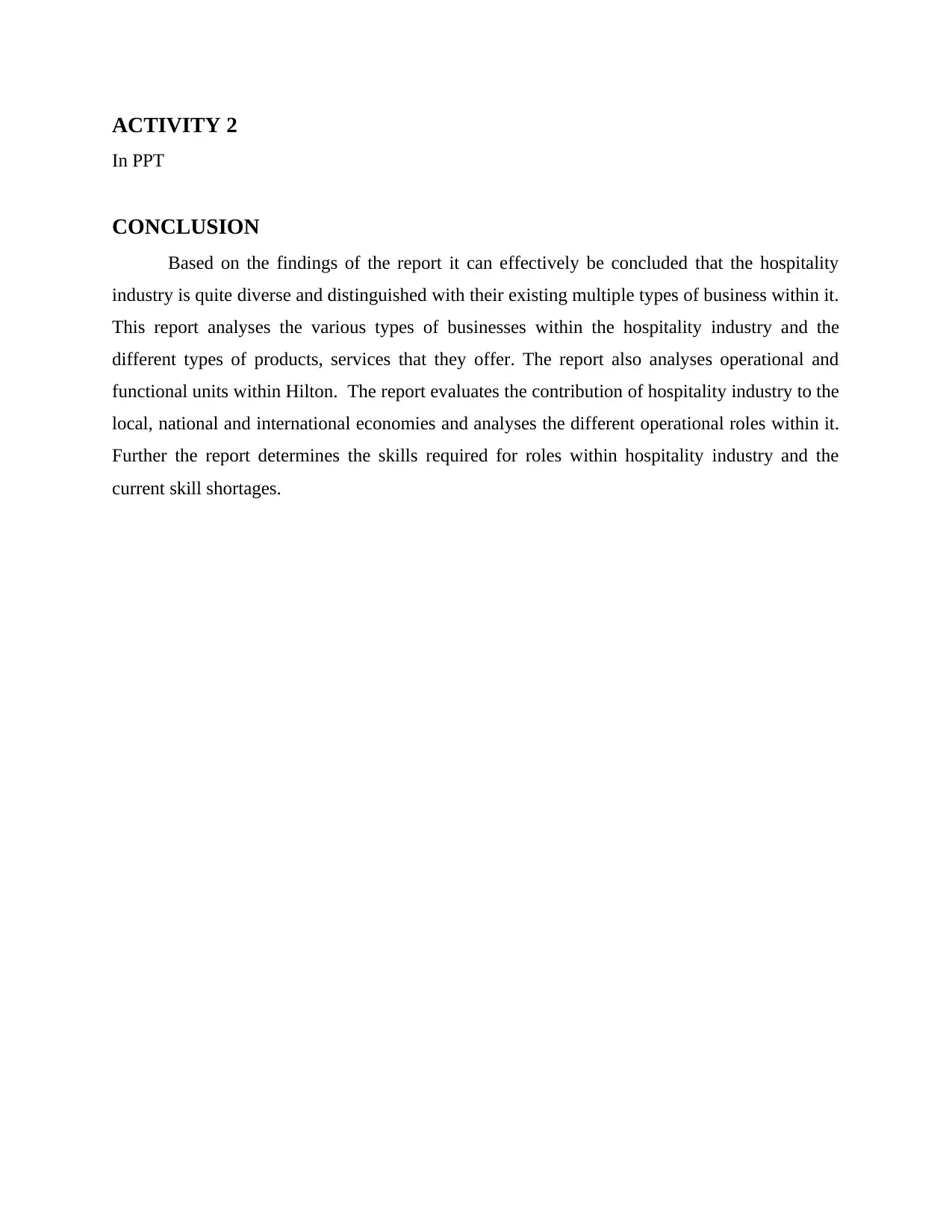
ACTIVITY 2
In PPT
CONCLUSION
Based on the findings of the report it can effectively be concluded that the hospitality
industry is quite diverse and distinguished with their existing multiple types of business within it.
This report analyses the various types of businesses within the hospitality industry and the
different types of products, services that they offer. The report also analyses operational and
functional units within Hilton. The report evaluates the contribution of hospitality industry to the
local, national and international economies and analyses the different operational roles within it.
Further the report determines the skills required for roles within hospitality industry and the
current skill shortages.
In PPT
CONCLUSION
Based on the findings of the report it can effectively be concluded that the hospitality
industry is quite diverse and distinguished with their existing multiple types of business within it.
This report analyses the various types of businesses within the hospitality industry and the
different types of products, services that they offer. The report also analyses operational and
functional units within Hilton. The report evaluates the contribution of hospitality industry to the
local, national and international economies and analyses the different operational roles within it.
Further the report determines the skills required for roles within hospitality industry and the
current skill shortages.
Paraphrase This Document
Need a fresh take? Get an instant paraphrase of this document with our AI Paraphraser
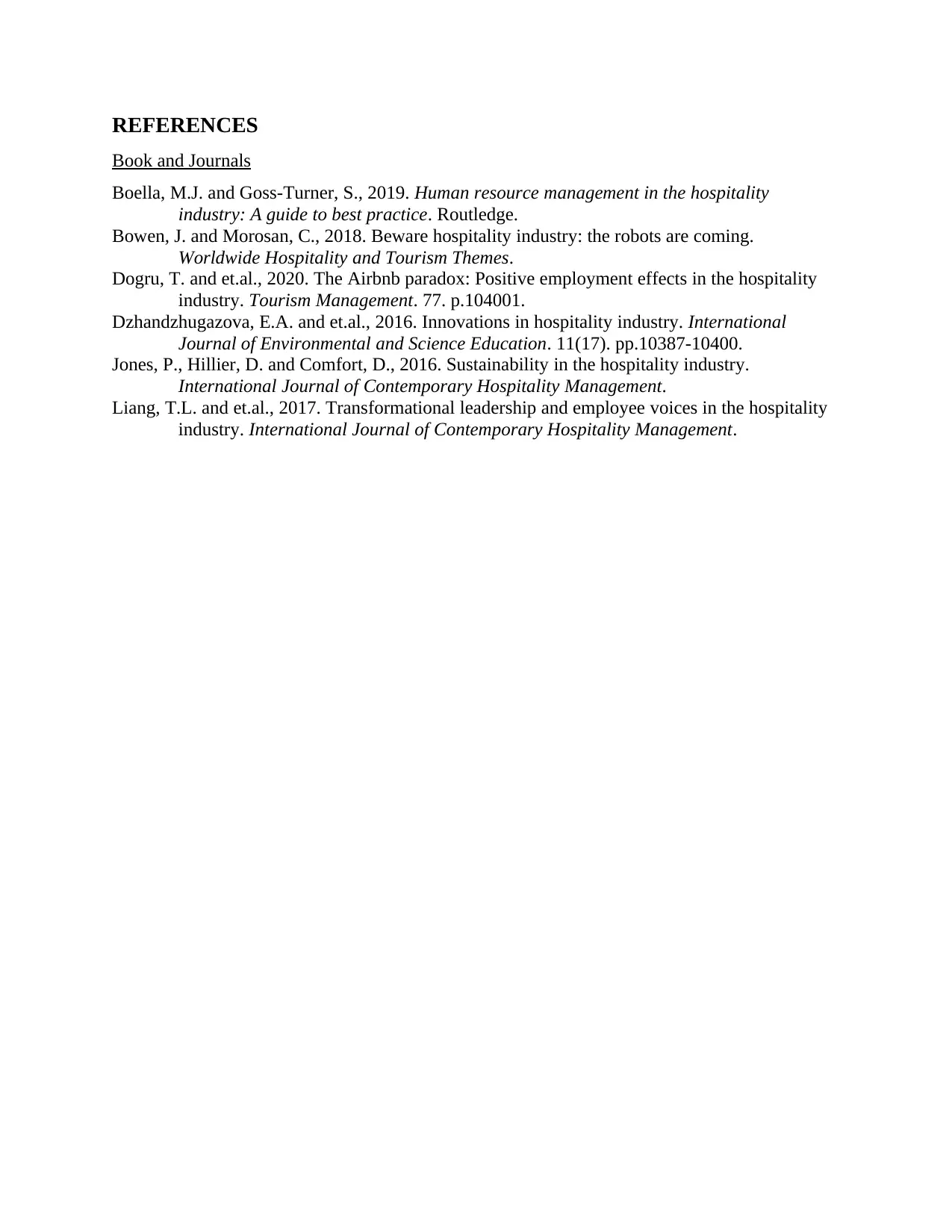
REFERENCES
Book and Journals
Boella, M.J. and Goss-Turner, S., 2019. Human resource management in the hospitality
industry: A guide to best practice. Routledge.
Bowen, J. and Morosan, C., 2018. Beware hospitality industry: the robots are coming.
Worldwide Hospitality and Tourism Themes.
Dogru, T. and et.al., 2020. The Airbnb paradox: Positive employment effects in the hospitality
industry. Tourism Management. 77. p.104001.
Dzhandzhugazova, E.A. and et.al., 2016. Innovations in hospitality industry. International
Journal of Environmental and Science Education. 11(17). pp.10387-10400.
Jones, P., Hillier, D. and Comfort, D., 2016. Sustainability in the hospitality industry.
International Journal of Contemporary Hospitality Management.
Liang, T.L. and et.al., 2017. Transformational leadership and employee voices in the hospitality
industry. International Journal of Contemporary Hospitality Management.
Book and Journals
Boella, M.J. and Goss-Turner, S., 2019. Human resource management in the hospitality
industry: A guide to best practice. Routledge.
Bowen, J. and Morosan, C., 2018. Beware hospitality industry: the robots are coming.
Worldwide Hospitality and Tourism Themes.
Dogru, T. and et.al., 2020. The Airbnb paradox: Positive employment effects in the hospitality
industry. Tourism Management. 77. p.104001.
Dzhandzhugazova, E.A. and et.al., 2016. Innovations in hospitality industry. International
Journal of Environmental and Science Education. 11(17). pp.10387-10400.
Jones, P., Hillier, D. and Comfort, D., 2016. Sustainability in the hospitality industry.
International Journal of Contemporary Hospitality Management.
Liang, T.L. and et.al., 2017. Transformational leadership and employee voices in the hospitality
industry. International Journal of Contemporary Hospitality Management.
1 out of 8
Related Documents
Your All-in-One AI-Powered Toolkit for Academic Success.
+13062052269
info@desklib.com
Available 24*7 on WhatsApp / Email
![[object Object]](/_next/static/media/star-bottom.7253800d.svg)
Unlock your academic potential
Copyright © 2020–2026 A2Z Services. All Rights Reserved. Developed and managed by ZUCOL.




